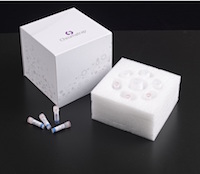Channels
Special Offers & Promotions
Wide Range of Epigenetic Assay Kits for Genomic Research
Chromatrap is a pioneer in the development of solid-state filter-based technology that significantly enhances and accelerates the important epigenetic research tool of chromatin immunoprecipitation (ChIP).
 The company has developed a range of optimised ChIP assay kits for use in many areas of genome research including classical qPCR, DNA sequencing and from formaldehyde fixed paraffin embedded samples (FFPE) using either discrete spin columns or dedicated 96-well filter plates.
The company has developed a range of optimised ChIP assay kits for use in many areas of genome research including classical qPCR, DNA sequencing and from formaldehyde fixed paraffin embedded samples (FFPE) using either discrete spin columns or dedicated 96-well filter plates.
The simplicity and efficacy of Chromatrap ChIP assays, enabling more IPs from less material, more quickly than traditional methods, has made them popular with a growing number of leading genetics research laboratories worldwide.
The Chromatrap 24 column ChIP-qPCR kit is a firm favourite with researchers worldwide offering a choice of sonication or enzymatic DNA shearing and is available with Protein A or G coupled filters for optimal DNA pull-down. For peace of mind and confidence in method validation, a new premium version of the kit is now available that includes positive and negative control antibodies. This is especially useful where the target antibody has not been validated in ChIP before, as this can often give unexpected results which are hard to interpret without the use of controls.
Chromatrap® is a business unit of Porvair Sciences, a wholly owned subsidiary of Porvair plc.
Launched worldwide in 2012 - Chromatrap® solid-state ChIP technology has been shown by a growing number of research groups worldwide to be more efficient than conventional bead-based methods. This is because the solid phase porous polymer, functionalized with either protein A or G, provides a greater surface area for chromatin antibody binding with very low non-specific binding. In addition, it uses a spin column approach, offering significant speed, process and carry-over advantages over sepharose or magnetic beads. DNA pull down with Chromatrap® is up to 25 times more than conventional methods, whilst the signal to noise ratio for DNA enrichment is 2 to 3 times better, even with low chromatin samples between 50ng to 3000ng per immunoprecipitation.
more news from porvair sciences
Media Partners


